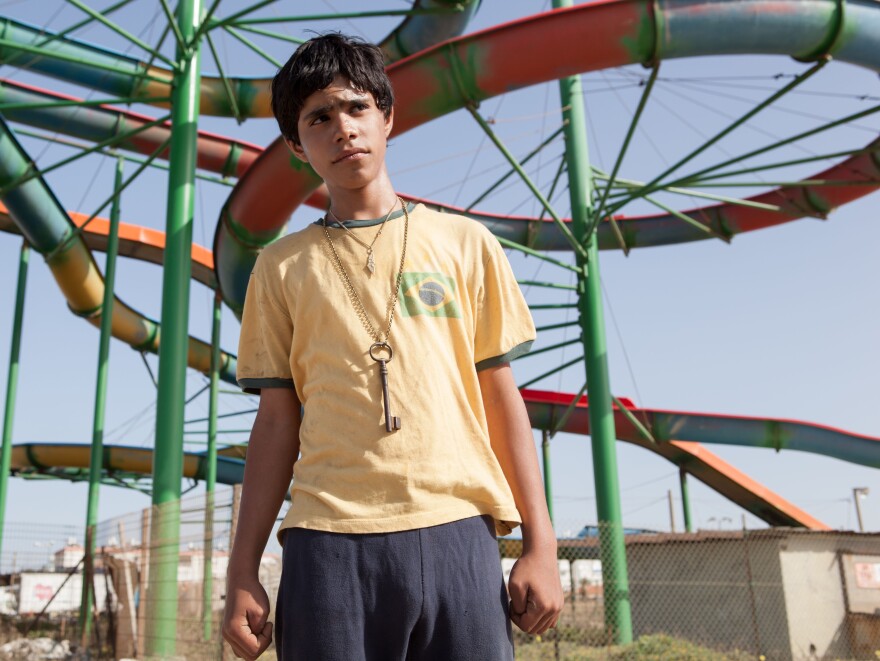Israeli director Eran Riklis often depicts characters separated by borders. In The Syrian Bride, a Druze woman leaves Israel to marry, knowing she can never return to visit her family; in Lemon Tree, a privileged Israeli woman and a disadvantaged Palestinian regard one another warily from opposite sides of the fence between free and occupied territory.
Zaytoun is different: This time, the director allows his characters to cross the frontier. That makes for a story that's sweeter, but also less convincing.
The film opens near Beirut in the ominous year of 1982, shortly before Israel invades Lebanon. Twelve-year-old Fahed (Abdallah El Akal) lives in a refugee camp for Palestinians. He's pretty focused on playing soccer — he's a Brazil fan — and making a little money selling gum and cigarettes on the street, though sometimes he's forced to go to school, where he's learning English, or a PLO training camp, where he's taught combat skills and battlefield medicine.
Encouraged by his father, who was born in a village that's now in Israel, Fahed supports the Palestinian cause. But he doesn't much care for his boot camp; whenever possible, he skips it to hang out with friends, which can involve dodging the fire of Lebanese Christian snipers.
Fahed's dad is cultivating a potted olive tree — zaytoun is Arabic for olive — that he intends to plant in the village of his birth. When the older man is killed by an Israeli plane, Fahed inherits the tree and the quest. Understandably, Fahed doesn't welcome the downed Israeli pilot who's brought to the camp where the boy and his only surviving relative, his grandfather, make their home.
At first, Yoni the aviator (Stephen Dorff) is no friendlier to Fahed. But he comes to see the wily kid as his guide back to Israel, and after some bartering, the two set out for the border. Fahed lugs the tree and his soccer ball, and insists that Yoni remain in handcuffs. But as they negotiate various hazards together, the pilot and the "terrorist" — as Yoni calls his guide — become friends.

While the journey is treacherous, it also includes farcical moments. The travelers get a ride in a cab whose stereo plays just one ironic tune: the Bee Gees' "Stayin' Alive." There's even a stop at an abandoned amusement park, where Yoni and Fahed play in the ruins. The tonal shifts are handled reasonably well, although the comic moments can feel incongruous in a movie that turns on Lebanon's savage civil war.
Yoni promises he'll take Fahed to his ancestral home. Once they reach the border, however, the Israeli military and a French-born U.N. peacekeeper (Alice Taglioni) insist that the boy be sent home. The compromise that's eventually reached is implausible, but it does allow the road trip and surrogate father-son relationship to continue a little longer.
Scripted by Nader Rizq, a Palestinian American, Zaytoun seems a bid for a wider audience than some stories of the region. The movie was produced by Britain's Gareth Unwin (The King's Speech) and proceeds mostly in English, the language Fahed and Yoni share. Focusing on a street-smart scamp, casting a moderately well-known Hollywood actor as his foil, and interrupting the trauma for moments of smiles and peaceful reverie seem calculated to make the film more congenial to mainstream audiences.
Congeniality isn't necessarily honesty, however, and Riklis regularly fudges. In other dramas inspired by Lebanon's long-running conflict, notably Incendies and Circle of Deceit, reflexive hatred and raw brutality regularly erupt. Despite being set on the brink of the same war that frames those stories, Zaytoun seems to transpire in a world where the worst men can do just isn't thinkable.
Copyright 2021 NPR. To see more, visit https://www.npr.org.


